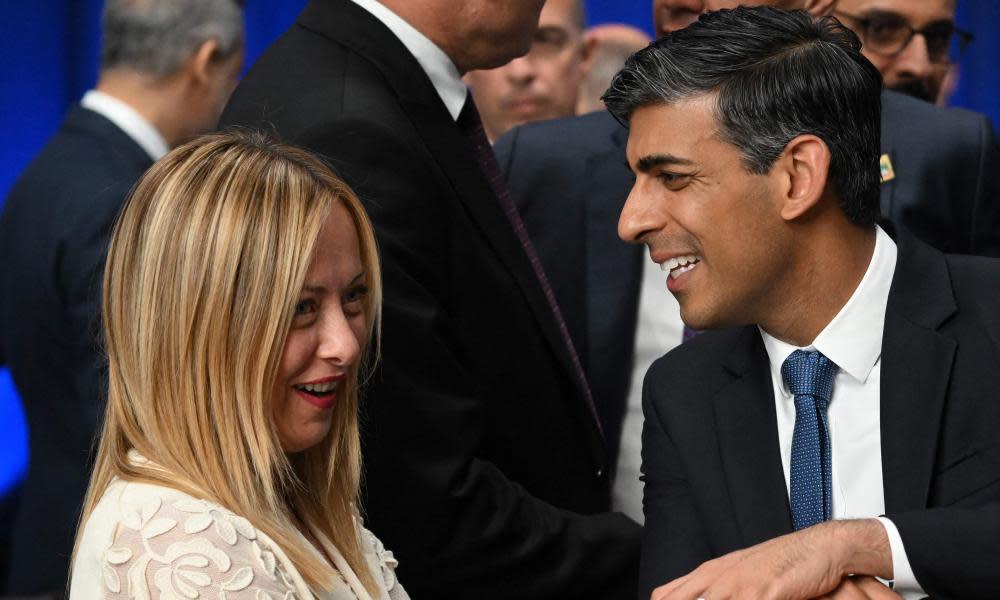Giorgia Meloni turns to Rishi Sunak to take battle against migration beyond EU

Giorgia Meloni has turned to the UK’s prime minister Rishi Sunak to take her battle against migration beyond the EU, it has emerged.
In what some are dubbing the Spanish framework, the prime ministers have forced migration on to the agenda at a historic meeting of about 50 European leaders in Granada on Thursday.
Having seen off Germany in her battle to get a Rome-friendly pact on migration agreed among EU member states on Wednesday, Meloni and Sunak have created another opportunity to wage war on their favourite topic on a wider international stage.
The leaders gathering for the European Political Community (EPC) summit had already been shepherded into groups themed on enlargement, defence, artificial intelligence, energy security and the climate emergency.
However at the 11th hour it emerged that Meloni had contacted Sunak after it became public that he had failed to persuade Spain, the EPC organiser, to put migration on the agenda.
The two prime ministers will now chair a separate group on the subject and are expected to raise the need for more coordination between the EU and the UK.
Sunak is expected to announce new bilateral initiatives with Belgium, Bulgaria and Serbia to increase intelligence sharing and operational cooperation.
Related: Italian PM ‘astonished’ at Germany paying charities for refugee rescues
Ahead of the meeting he said: “Levels of illegal migration to mainland Europe are the highest they have been in nearly a decade. With thousands of people dying at sea, propelled by people smugglers, the situation is both immoral and unsustainable. We cannot allow criminal gangs to decide who comes to Europe’s shores.”
The EPC is the brainchild of Emmanuel Macron, but behind the scenes the leaders are also raising questions about its future viability.
The vision behind the EPC was to create a platform for informal discussions between leaders within and outside the EU and bring the Balkan states, Turkey and Armenia and Azerbaijan firmly into the European tent.
Bilateral meetings of “brush-by” short encounters between leaders on the white leather sofas in the vast El Palacio de Congresos conference centre is where the real business will take place.
Hopes that peace talks could be brokered between Azerbaijan and Armenia fell apart after Azerbaijan’s president, Ilham Aliyev, turned down a European meeting in Spain with Armenia’s prime minister, Nikol Pashinyan, because of European support for Yerevan.
Pashinyan later said he would still go to the summit but said it was a “shame” that the two leaders would not be able to sign a “turning point document” on the contested Karabakh region.
It is also uncertain if Turkish prime minister, Recep Tayyip Erdoğan, will appear.
As of Wednesday night, there were no plans for brokered talks between Kosovo and Serbia amid continuing political hostility between the two countries.
Leaders from both sides will be in Granada and a last-minute intervention by Macron or Germany’s chancellor, Olaf Scholz, to get them into the same room has not been ruled out.
Enlargement and the Russian war will remain at the top of the agenda in all discussions particularly in the wake of recent jitters in the US over continued contributions to Ukraine’s defence.
The expansion of the EU will also be the main item on the agenda at a second meeting of EU leaders on Friday morning.
In the last 24 hours it emerged that it could cost at least €250bn to accommodate all nine countries waiting to join the EU.
Some countries are already backing a 2027 deadline for reforms within the EU and say if modelling of budgets was signed off by then, accommodating new countries would be easier.
Some believe there can be a gradual phased-in accession of new states, but others, including the EU’s chief diplomat, have rejected that notion saying the only membership is full membership.


